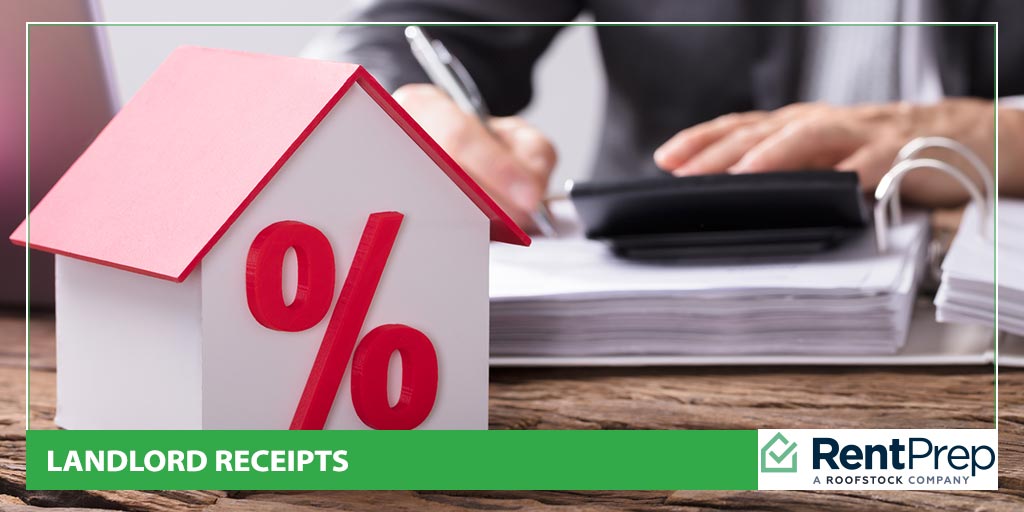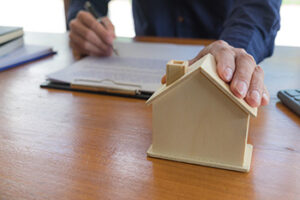
As a landlord, you’re responsible for various transactions with your tenants. Not only do these transactions affect your day-to-day business, but they also could be an important part of future eviction cases or disputes between you and your tenant.
For that reason, it’s always wise to document the transfer of funds with a receipt.
Keeping receipts of transactions that have been completed as part of the tenancy can keep communication clear and help to protect your business in the future, so it is important to be diligent about record keeping.
In this post, we will share the receipts that landlords should be using to track important interactions with tenants.
Table of Contents for Landlord Receipts
- Why are receipts important for landlords and tenants?
- Basic components of a receipt
- Rent receipt template
- Security deposit receipt form
Why are receipts important for landlords and tenants?

A receipt is a simple form that can document the transaction of funds between two individuals.
Depending on the type of transaction, a receipt might carry more importance. Having documentation of the ice cream cone you purchased isn’t imperative but being able to prove you paid a tenant their security deposit may come in handy.
A receipt might be the difference between proving to a judge that you did indeed pay the landlord or tenant and are not on the hook for additional payments.
In each topic below, we will discuss the merits of writing and keeping receipts with your tenants.
Basic Components of a Receipt
There are 5 items the IRS requires for any receipt [source Berkeley Law]
Here are those five items:
- Name of vendor (person or company you paid)
- Transaction date (when you paid)
- Detailed description of goods or services purchased (what you bought)
- Amount paid
- Form of payment (how you paid – cash, check, or last four digits of a credit card)
You’ll want to make sure that your receipts include all five elements to ensure they’re compliant with the courts.
Rent Receipt Template
This link will take you to our rent receipt template.
If you want to customize this to your liking, here are the important items to include:
- Date
- Property address
- Tenant Name(s)
- Receipt total
- Rent period
- Landlord/Agent name
- Balance due
Who benefits from a rental receipt?
This is extremely important for a renter who pays rent in cash.
A renter should never pay cash, without receiving a rental receipt, because there will be no paper trail proving they paid rent that month. Without proof of their payment, it would be all but impossible to prove that payment was made if there was a dispute about the payment status.
In some areas of the country (such as Maryland) a landlord is required to provide a receipt if the renter pays in cash.
A simple email from the landlord or property manager can go a long way. Whether it is required or not, you should always give your renters that pay in cash a receipt. This is simply good business practice, and it doesn’t have to be difficult to provide.
Example Email Template
(Tenant name),
This email confirms the receipt of $750 for rent payment for May 2018 paid to (insert landlord or property manager name).
This payment was received on __/__/__ and was paid in (insert payment method) for rent at (insert property address).
Thank you,
(Landlord/Property Manager)
This email covers the five IRS requirements for a receipt and also provides a digital stamp for both parties.
If you can show a copy of this email to a judge, it will go further than a simple rental receipt lacking a signature, as it is tied to an email address of the issuing party.
Security Deposit Receipt Form

A rental deposit receipt should be issued when funds are accepted and paid back to a tenant.
Here is a receipt for security deposit form that you can use for your business.
| Security Deposit Receipt |
The rental lease agreement should highlight the amounts of a security deposit, but it is good practice to issue a receipt as well to confirm receipt of the payment as agreed upon during the lease signing.
Landlords should require that the security deposit be paid in certified funds because you don’t want a check to bounce from a tenant that just received access to a rental. If that were to occur, a landlord may have to go through an entire eviction process to recover the rental (this depends on the state).
State Security Deposit Laws
Every state has specific security deposit laws that may affect how much money you can collect, when you can withhold the money, and where you have to keep the money during the tenancy.
In many states, it is required that you keep the money in a separate account and pay any interest gained back to the tenant at the end of their lease period.
Being familiar with all of these laws and stipulations is important to ensure that you are not illegally collecting and withholding money from your tenant.
Maximums
This is most common thing that you are going to encounter in your state or local security deposit. Even in states that do not have a security deposit maximum limit, it’s usually best to collect no more than the equivalent of two month’s rent. Collecting more than this may put you at risk of appearing to be opportunistic should the need for a court case arise.
It’s easy to find out what the limit is for your state’s security deposits. Doing a simple search online will give the answer, and you’ll want to make sure that you are always aware of the most recent amounts.
Withholding
When your tenant moves out, you are legally required to give them back their security deposit money within a certain amount of time. In some states, this is 21 days while it is 30 days in others. Check your state’s specific laws to be sure of your situation.
You are, however, permitted to withhold money for certain things. While you cannot withhold money to cover unpaid rent in most cases, you can withhold money to cover the cost to repair any damages outside of normal wear and tear.
What type of damages would qualify? The following would all be considered damages outside of normal wear, and you could reasonably withhold the cost of repair from the deposit:
- Pet damages caused by undisclosed pets
- Unapproved improvements made to the property, such as built-in shelves
- Excessive debris and trash left behind
- Broken appliances that were never reported to you
- Missing appliances that were provided by you
If you are not sure about whether or not you can withhold for a specific issue, think about what must have caused the damages. Could this have happened through normal usage, or was the tenant being careless on the property? Answering this question can help you decide whether or not to withhold.
In Conclusion
The extra effort of providing receipts to tenants can be invaluable down the line.
You can avoid miscommunications and potential litigations by having your transactions documented with a receipt.
Again, it’s a good idea to email a copy of each receipt to your tenant or landlord in order to create a digital paper trail for future reference.

